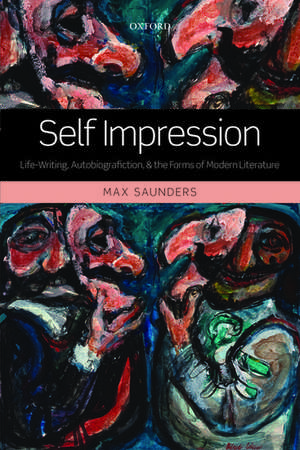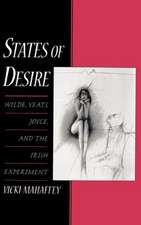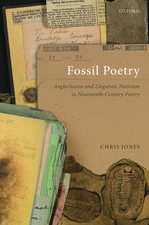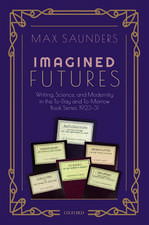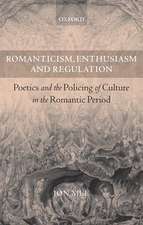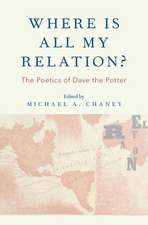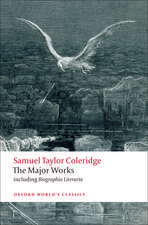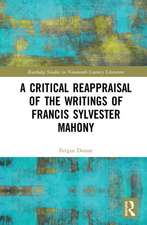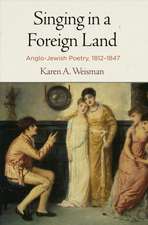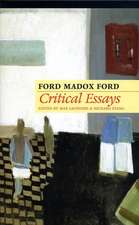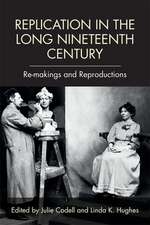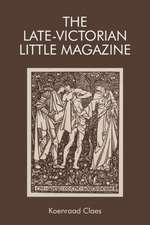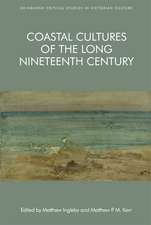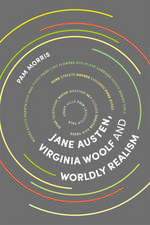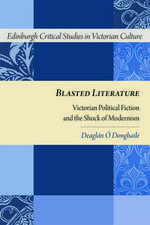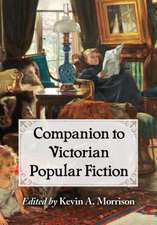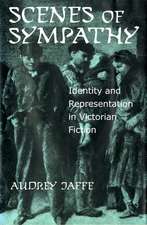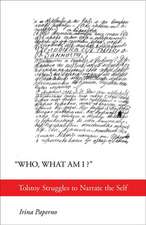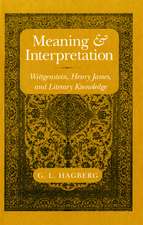Self Impression: Life-Writing, Autobiografiction, and the Forms of Modern Literature
Autor Max Saundersen Limba Engleză Paperback – 21 mar 2013
| Toate formatele și edițiile | Preț | Express |
|---|---|---|
| Paperback (1) | 328.34 lei 32-37 zile | |
| Oxford University Press – 21 mar 2013 | 328.34 lei 32-37 zile | |
| Hardback (1) | 855.32 lei 32-37 zile | |
| OUP OXFORD – 22 apr 2010 | 855.32 lei 32-37 zile |
Preț: 328.34 lei
Preț vechi: 367.97 lei
-11% Nou
Puncte Express: 493
Preț estimativ în valută:
62.83€ • 65.78$ • 52.11£
62.83€ • 65.78$ • 52.11£
Carte tipărită la comandă
Livrare economică 31 martie-05 aprilie
Preluare comenzi: 021 569.72.76
Specificații
ISBN-13: 9780199657698
ISBN-10: 0199657696
Pagini: 576
Ilustrații: 6 black-and-white halftones
Dimensiuni: 158 x 233 x 29 mm
Greutate: 0.81 kg
Editura: Oxford University Press
Colecția OUP Oxford
Locul publicării:Oxford, United Kingdom
ISBN-10: 0199657696
Pagini: 576
Ilustrații: 6 black-and-white halftones
Dimensiuni: 158 x 233 x 29 mm
Greutate: 0.81 kg
Editura: Oxford University Press
Colecția OUP Oxford
Locul publicării:Oxford, United Kingdom
Recenzii
Review from previous edition Saunders's account ... is the most important recent contribution to the genealogy of modern literature ... The paradoxy of autobiografiction never disorients him; rather, it inspires plentiful pithy wisdom in a book that seems to end every paragraph aphoristically. Theory and history, history and form get their due recognition, and the book as a whole is an apt and exciting tribute to its subject, capable of everything necessary to prove that life-writing has meant everything to literary modernity.
Review from previous edition It is likely to become a major critical resource, not just for research on early twentieth-century life-writing, but also as part of the ongoing revision of the whole century's literary history.
very wide-ranging and intellectually stimulating ... Conspicuous in its originality ... an outstanding contribution
a remarkable book, in its length, its historical range (Pater to Byatt) and its fluid genre crossings... Saunders explores the relationship of autobiography to fiction in general, the relationship of the synthetic category 'autobiografiction' to modernism, and by so doing gives us an unusually unified account of modernism... The sheer weight of research and knowledge is astonishing and lightly, even conversationally, worn; Saunders seems to have read every fiction, auto-fiction and pseudo-fiction from the last 150 years... Too many excellent features of this magisterial book can be mentioned only in passing
Saunders can rearrange the familiar landmarks of modernist prehistory to fit an entire tradition of imaginary autobiography that has been occluded or marginalised by the grand narrative of modernisms impersonality... its new readings of well-known authors and works are dazzling; its new scholarship on unknown or little-known authors and works is fascinating. It revitalises the old literary-historical category of the transition (that is, from Victorian to modern, 1880-1920)
Saunders' mode of presentation is very precise and sharp... a very important book for the discussion of the relationship between Modernism and Life-Writing.
A breathtakingly comprehensive study... Self Impression is an important book that will inspire further work on life-writing in the modern period... Recent publications provide other examples of books that call out for the application of Saunders's approach. The first volume of the complete and authoritative edition of the Autobiography of Mark Twain has just been published... Once again, we are in the realm of autobiografiction that Saunders has so brilliantly mapped out.
compendious in the best sense of the term... Saunders's knowledge of, and ability to critique with extraordinary critical sensitivity, the wide swathes of European literature is remarkable. Even more impressive is his handling of the intricate filaments which bind these texts together, which make them constantly mutually allusive. This makes for a constant fascination... It is a measure of the depth of thinking in this book that the complexities of autobiographical modes and the relevance of the category of impressionism, while compelling in themselves, tend to recede and to be replaced by larger questions. Who am I when I write? Who am I when I read? What is it like to be 'carried away' by a book?... These are questions which, as Saunders delicately puts it, have been raised in one form or another by de Man, Hartman, Derrida; but here they receive a rare depth and range of articulation which puts flesh on the bones of abstract argument
wide-ranging and consequential new account of British literature from 1870 to 1930 ... In modernism, as Saunders demonstrates in impressive detail, we may find an astonishing variety of experimental interactions between biography, autobiography, fiction, and criticism ... With this vast body of evidence, quoted generously and treated expertly, Saunders makes a compelling case for reading modernism as a discourse of im/personality. [One of] two exceedingly good books - stimulating in their arguments, rich in attention to literary and scholarly detail, and engagingly written.
Review from previous edition It is likely to become a major critical resource, not just for research on early twentieth-century life-writing, but also as part of the ongoing revision of the whole century's literary history.
very wide-ranging and intellectually stimulating ... Conspicuous in its originality ... an outstanding contribution
a remarkable book, in its length, its historical range (Pater to Byatt) and its fluid genre crossings... Saunders explores the relationship of autobiography to fiction in general, the relationship of the synthetic category 'autobiografiction' to modernism, and by so doing gives us an unusually unified account of modernism... The sheer weight of research and knowledge is astonishing and lightly, even conversationally, worn; Saunders seems to have read every fiction, auto-fiction and pseudo-fiction from the last 150 years... Too many excellent features of this magisterial book can be mentioned only in passing
Saunders can rearrange the familiar landmarks of modernist prehistory to fit an entire tradition of imaginary autobiography that has been occluded or marginalised by the grand narrative of modernisms impersonality... its new readings of well-known authors and works are dazzling; its new scholarship on unknown or little-known authors and works is fascinating. It revitalises the old literary-historical category of the transition (that is, from Victorian to modern, 1880-1920)
Saunders' mode of presentation is very precise and sharp... a very important book for the discussion of the relationship between Modernism and Life-Writing.
A breathtakingly comprehensive study... Self Impression is an important book that will inspire further work on life-writing in the modern period... Recent publications provide other examples of books that call out for the application of Saunders's approach. The first volume of the complete and authoritative edition of the Autobiography of Mark Twain has just been published... Once again, we are in the realm of autobiografiction that Saunders has so brilliantly mapped out.
compendious in the best sense of the term... Saunders's knowledge of, and ability to critique with extraordinary critical sensitivity, the wide swathes of European literature is remarkable. Even more impressive is his handling of the intricate filaments which bind these texts together, which make them constantly mutually allusive. This makes for a constant fascination... It is a measure of the depth of thinking in this book that the complexities of autobiographical modes and the relevance of the category of impressionism, while compelling in themselves, tend to recede and to be replaced by larger questions. Who am I when I write? Who am I when I read? What is it like to be 'carried away' by a book?... These are questions which, as Saunders delicately puts it, have been raised in one form or another by de Man, Hartman, Derrida; but here they receive a rare depth and range of articulation which puts flesh on the bones of abstract argument
wide-ranging and consequential new account of British literature from 1870 to 1930 ... In modernism, as Saunders demonstrates in impressive detail, we may find an astonishing variety of experimental interactions between biography, autobiography, fiction, and criticism ... With this vast body of evidence, quoted generously and treated expertly, Saunders makes a compelling case for reading modernism as a discourse of im/personality. [One of] two exceedingly good books - stimulating in their arguments, rich in attention to literary and scholarly detail, and engagingly written.
Notă biografică
Max Saunders is Director of the Arts and Humanities Research Institute and Professor of English and Co-Director at the Centre for Life-Writing Research at King's College London.
